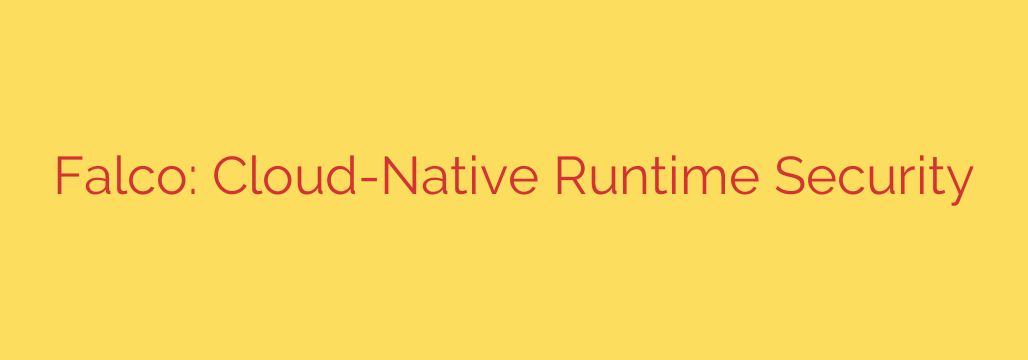
Defending Your Cloud: Why Runtime Security with Falco Matters
In today’s dynamic cloud environments, security is no longer a static configuration. It demands constant vigilance and real-time threat detection. This is where runtime security steps in, providing a crucial layer of defense that protects your applications and infrastructure while they’re actively running. One powerful tool leading the charge in this space is Falco.
Imagine your cloud environment as a bustling city. Firewalls and access controls are like the city walls and checkpoints, preventing unauthorized entry. But what happens when an attacker manages to slip past these initial defenses? Runtime security acts as the city’s security force, constantly monitoring activity and responding to suspicious behavior.
Falco operates by observing system calls, the low-level requests that applications make to the operating system kernel. By analyzing these calls, Falco can detect anomalous activities that might indicate a security breach. Think of it as recognizing a burglar by the way they interact with a door lock, even if they have a legitimate key.
Here are some of the key benefits of implementing Falco in your cloud security strategy:
- Real-time Threat Detection: Falco identifies suspicious activities as they happen, allowing you to respond quickly and mitigate potential damage. This immediacy is critical in minimizing the impact of attacks.
- Comprehensive Visibility: By monitoring system calls, Falco provides deep insight into the behavior of your applications and infrastructure, uncovering threats that might be missed by traditional security tools.
- Customizable Rules: Falco’s rule engine is highly flexible, allowing you to define specific behaviors that are considered suspicious in your environment. This ensures that you’re alerted to the threats that matter most to your organization.
- Cloud-Native Integration: Falco is designed to seamlessly integrate with container orchestration platforms like Kubernetes, making it an ideal solution for securing modern cloud deployments.
- Open Source and Community-Driven: Being an open-source project, Falco benefits from the collective expertise of a large and active community, ensuring continuous improvement and timely updates.
What kind of threats can Falco detect? The possibilities are extensive, but here are a few examples:
- Unexpected Shell Spawning: Detecting when a container unexpectedly spawns a shell process, which could indicate that an attacker has gained access.
- Unauthorized File Access: Alerting you when a process attempts to read or write to sensitive files, suggesting potential data exfiltration or tampering.
- Privilege Escalation: Identifying attempts to escalate privileges within a container, a common tactic used by attackers to gain control of the system.
- Network Anomalies: Flagging unusual network activity, such as connections to suspicious IP addresses or unexpected data transfer volumes.
Getting Started with Falco:
Implementing Falco might seem daunting, but it’s more accessible than you think. Here’s a simplified roadmap:
- Installation: Falco can be installed on various platforms, including Linux hosts and Kubernetes clusters. Refer to the official Falco documentation for detailed installation instructions.
- Configuration: Customize Falco’s rules to match your specific security requirements. Start with the default ruleset and gradually add or modify rules based on your environment’s unique characteristics.
- Integration: Integrate Falco with your existing security tools and workflows. This might involve sending alerts to a SIEM system, triggering automated responses, or integrating with your incident management platform.
- Monitoring: Continuously monitor Falco’s output and fine-tune your rules as needed. This iterative process will ensure that Falco remains effective in detecting and responding to evolving threats.
Pro Tip: Regularly review and update your Falco rules. As your applications and infrastructure evolve, so too will the tactics used by attackers. Keeping your rules up-to-date is essential for maintaining a strong security posture. Consider implementing automated rule updates or subscribing to security intelligence feeds that provide pre-built rules for emerging threats.
By proactively implementing runtime security with Falco, you can significantly enhance your cloud security posture, detect threats in real-time, and minimize the impact of potential attacks. It’s a critical investment in the protection of your valuable data and applications.
Source: https://www.helpnetsecurity.com/2025/07/16/falco-open-source-cloud-native-runtime-linux-security-tool/








